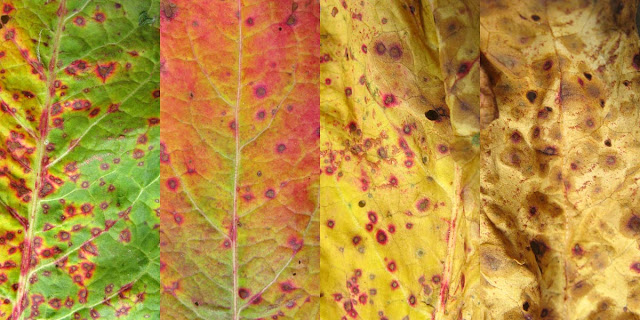That's not to say it's nature's fault alone that we've got as many as we have. We've been quite happily using the soil from molehills around the garden, without being aware that:
A large mature broad-leaved dock can produce up to 60,000 ripe seeds per year.So, the soil we had been using, fetched up by the moles, is full of dock seeds. And you need to pull the dock seedlings up before their long tap root is established, for then you'll need to dig it up. But if you leave a part of the root behind, it will grow again.
Dock seed numbers in soil have been estimated at 5 million per acre. The seeds contain a chemical that inhibits microbial decay and are capable of surviving in undisturbed soil for over 50 years.
Info here.
In The Poacher, H E Bates writes of an agricultural labourer in Victorian times pulling docks:
Towards the end of May, before the corn was too high, the docks had to be pulled. The men worked with hooked sticks of ash or hazel, using the hooks to lever under the forks of the dock-roots. The docks had to be uprooted unbroken, to the last tip of hair root. And periodically Thompson came into the field in order to watch and see that that was done. He would walk up and down the rows behind the men, watching but not speaking, like a guard in charge of a working party of prisoners. The men were silent too, pulling up the docks and throwing them aside, into the osier corn-skips, without a murmur. Thompson walked only a yard or two behind the men, so that eventually, when a man broke off a dock too short, he would be near enough to kick him in the back.But docks are pretty, too. They go through a range of colours as they die, from green to red to yellow to brown.
One afternoon Luke broke a dock short, leaving the root half in the earth, and Thompson, standing just behind, kicked him. Luke fell heavily on his knees and hands among the corn. The blow from Thompson's foot seemed terrific. and for a moment or two he could not get up. While he lay there Thompson kicked him again.
'Get up,' he said, 'can't you?'
Luke got up. He was dazed and could not see Thompson clearly.
'Get it out clean,' said Thompson.
Luke looked round for his stick.
'Get it out,' Thompson repeated.
The stick lay a yard or two up the rows and as Luke bent forward to pick it up Thompson aimed another kick at him.
'Now get it up,' he said.
Luke half-knelt among the corn and began to uproot the dock again, his back turned away from Thompson. He felt curiously weak, submissive. The kick had knocked the spirit out of him. He worked at the dock mechanically, conscious of nothing but the pain in his buttocks and his fear of Thompson standing over him. He scratched the dry earth with his hands, like a dog, in order to find where the root had broken off, yellow, under the surface. All the time Thompson stood over him, saying nothing. It was only when the thin spear of dock-root had been pulled out that Thompson spoke again.
'Now you know,' he said.
Luke said nothing.
'Don't you? Answer me.'
'Yes.'
'Then take care you don't forget.'
---------------------------------------------------------------------------------------------------
Later...
It seems that the only way to deal with docks in the veg growing areas is to dig them out whenever they appear and rot them down in a plastic bag. The residue can be returned to the garden via the compost heap; so nothing is lost and, hopefully, the docks will not grow again.
But, thinking about it, it seems that if a plant has such a strong grip on survival, maybe it's got something we could benefit from. There's a couple of videos by Frank Cook, here, that discuss the edibility of dock and the benefits of the root.
After watching these, I researched Frank Cook and was shocked to discover that he had died. This is his obituary.


No comments:
Post a Comment